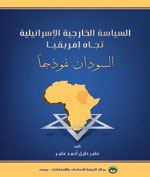A new book is published by Al-Zaytouna Centre for Studies and Consultations entitled The Israeli Foreign Policy towards Africa: The Sudan Case, by the researcher ‘Amer Khalil Ahmad ‘Amer.
The book is 160 pages long and it studies the Israeli foreign policy towards Africa, while focusing on the case of Sudan. It discusses the aims of this policy as the Afro-Israeli bilateral relations had passed through several ups and downs. It explores how this policy was implemented and which governmental institutions executed such policies.
| Publication Information
Title: Al-Siyasah al-Kharijiyyah al-Israeliyyah Tijah Ifriqya: Al-Sudan Namudhajan |
 |
Undoubtedly, since the establishment of the Zionist movement, Africa was one of its priorities, as at the beginning of the twentieth century, Uganda was suggested as a Jewish homeland. Several reasons have prompted the Israeli interest in the black continent; it wanted to have influence over the Arab water security—as the Nile is strategically important to Egypt, Sudan and other countries—in addition, to threaten the Arab maritime in the Red Sea and forbid its transformation into an Arab lake, and it also wanted to weaken African support for Arab causes.
The Israeli vision of Sudan as a state is explained in the book, where it reviews the history of Israeli-Sudanese relations that started in the early fifties of the last century. The Israeli keenness on building direct or indirect relations with Sudan is based on a fundamental Israeli strategy, i.e., tightening the relations with the African countries will provide an exit for Israel out of its isolation in the midst of the Arab region. Thus, these relations will secure for it alternative commercial, political and security relations. It proves that Israel has ambitions in Sudan’s water and oil. Furthermore, the book tells how Israel took advantage of its good relations with Sudan during the period of the then President Jaafar Nimeiri to facilitate the migration of the Falasha Jews.
Amer explores the Israeli role in the partitioning of Sudan, its relations with John Garang and the Darfur case, in addition to the effect of the Israeli foreign policy towards Africa on Arab national security. At the end, the author puts forward several recommendations for facing the Israeli threats to the Arab countries in Africa.



Leave A Comment